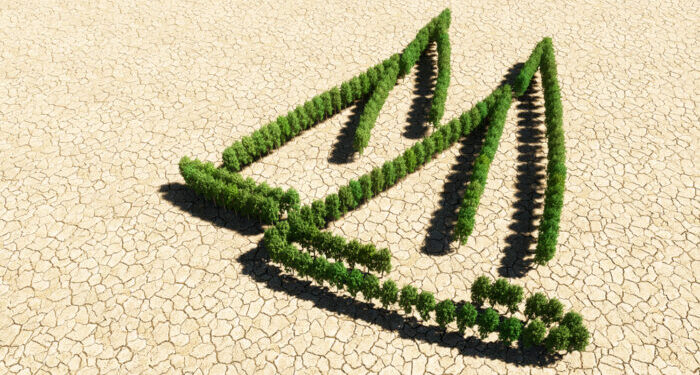Amid an increasing interest in carbon capture and storage (CCS) as a promising green technology to address CO2 emissions from shipping, maritime transport is expected to dominate the CCS value chain, which is forecast to lead to a growing demand for liquefied CO2 (LCO2) carriers. In this value chain, liquefied CO2 carriers play an essential role in transporting liquefied CO2 to the sites where it is stored and/or utilized.
Carbon Capture and Storage: A promising technology
Carbon capture and storage is a complex method describing the capture of carbon dioxide before it enters the atmosphere, its transportation and storage in coal seams, aquifers, depleted oil and gas reservoirs and other spaces deep under the surface of the Earth. The long-term storage of CO2 is a relatively new concept, even though CO2 has been injected into geological formations for some decades already, in procedures like enhanced oil recovery.
The technology is considered an effective way to prevent the release of CO2 from heavy industry, thus a necessary concept for realizing a carbon-neutral society. However, as with every green technology, CCS does not come without disadvantages. Opponents of this alternative stress that many CCS projects have failed to deliver on promised emissions reductions or sometimes shift the focus from carbon removal to indefinite fossil fuel usage, disguised as marginal emission reductions.
CO2 Carriers: How this works
After capture, the CO2 must be transported to suitable storage sites. While pipelines are the cheapest form of transport, there has been an increasing interest in ships for carbon storage, in cases when pipelines are infeasible. Specifically for long distances and for relatively smaller quantities of CO2, the advantage of marine transportation of carbon is the lower cost than pipelines, as well as rail and trucks.
If the delivery point is onshore, the CO2 is unloaded from the ships into temporary storage tanks. If the delivery point is offshore – as in the ocean storage option – ships might unload to a platform, to a floating storage facility (similar to a floating production and storage facility routinely applied to offshore petroleum production), to a single-buoy mooring or directly to a storage system.
A marine transportation system includes temporary storage on land and a loading facility. The capacity, service speed, number of ships and shipping schedule will be planned, taking into account the capture rate of CO2, transport distance, and social and technical restrictions. CO2 transportation by ship has a number of similarities to LPG transportation by ship.
Where we stand
The use of ships for transporting CO2 is currently in a rudimentary stage, with only four small ships used for this purpose globally as of 2018, according to data provided by IPCC. These ships transport liquefied foodgrade CO2 from large point sources of concentrated CO2, such as ammonia plants in northern Europe to coastal distribution terminals in the consuming regions.
However, several recent initiatives seem to validate an increasing interest for CCS technology. Earlier within the month, Japanese shipping firm NYK and Norwegian Knutsen Group established a joint venture company for the commercial development of a liquefied CO2 marine transportation and storage business worldwide. The establishment of this joint venture is considered as an important foothold for maritime participation in the CCUS value chain.
It was at the end of last year when Japanese shipping company MOL and compatriot Mitsubishi Shipbuilding Co. announced completion of a concept study of the multiple hull forms for a liquefied CO2 carrier, paving the way for commercialization of this ship type in the near future.
A bit earlier in 2021, South Korean Hyundai Heavy Industries (HHI), the world’s largest shipbuilder, in cooperation with Korea Shipbuilding & Offshore Engineering CO. (KSOE) reached a landmark for the future design and capabilities of the LCO2 fleet, after unveiling a design for a new 40,000-cubic-meter liquified CO2 carrier design, which was granted an Approval in Principle by DNV and the Liberian Registry (LISCR). In May 2021, KSOE was also involved in an agreement with ABS, Hyundai Mipo Dockyard (HMD) and the Republic of the Marshall Islands (RMI) Maritime Administrator for the development of liquefied CO2 carrier ship designs.
The way forward for CO2 carriers
CO2 transportation through shipping has been gaining momentum for its techno-economic feasibility in comparison to other transportation options. Ship transport becomes cost-competitive specifically with pipeline transport over larger distances. Meanwhile, R&D on a natural gas hydrate carrying system intended to replace LNG systems is in progress, and the results might be applied to CO2 ship transport in the future. As demand for carbon capture expected to grow, the gas carrier sector in cooperation with classification societies are examining development of bigger CO2 carriers.
Of course, CO2 transport entails both technical and operational challenges that require cooperation between industries and stakeholders across the supply chain. For instance, while fire risk for CO2 tankers and terminals is considerably lower than other ship types, a main risk concerns the scenario of a tank rupture.
“This risk can be minimized by making certain that the high standards of construction and operation currently applied to LPG are also applied to carbon dioxide. An accident to a liquid CO2 tanker might release liquefied gas onto the surface of the sea. However, consideration of such an event is a knowledge gap that requires further study”, an IPCC report reads.




































































